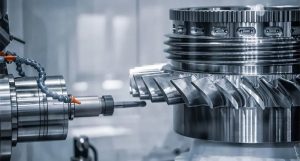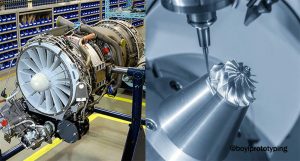High-precision CNC machining technology plays a crucial role in meeting the stringent demands of both the aerospace and automotive industries. Here’s how CNC machining addresses the needs of these sectors:
Aerospace Industry
- Precision and Accuracy: CNC machining provides the high precision required for aerospace components, ensuring that parts function flawlessly under extreme conditions. This technology can achieve micron-level accuracy, which is essential for components like engine parts and structural elements.
- Material Versatility: CNC machining can work with a wide range of materials, including titanium and aerospace-grade aluminum alloys, which are critical for aerospace applications due to their strength-to-weight ratio.
- Complex Geometries: CNC machining enables the production of complex geometries that are often impossible or too expensive to achieve with other methods. This capability is vital for creating intricate parts such as engine components and structural elements.
- Scalability: CNC machining can scale from prototyping to mass production, making it suitable for both small-scale and large-scale aerospace projects.
Automotive Industry
- Precision and Consistency: CNC machining ensures that automotive components are produced with high precision and consistency, which is crucial for maintaining vehicle performance and safety standards.
- Speed and Efficiency: CNC machining automates complex tasks, significantly reducing production time compared to manual methods. This efficiency is particularly beneficial for large-scale production.
- Customization and Prototyping: CNC machining allows for rapid prototyping and customization of parts, such as engine components and suspension systems, without requiring expensive tooling changes.
- Cost-Effectiveness: While CNC machining offers high precision, it also provides cost-effective solutions for manufacturing complex components, making it an attractive option for automotive manufacturers.
In summary, high-precision CNC machining technology is indispensable for both industries due to its ability to deliver precise, consistent, and complex parts efficiently, which are critical for ensuring safety, performance, and reliability in aerospace and automotive applications.





